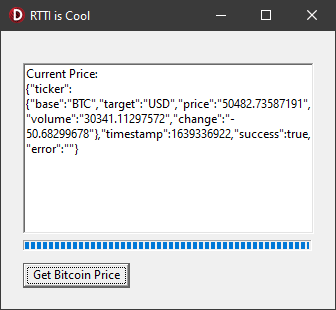I was speaking with a colleague the other day who was working on a project which relied on the popular Delphi component trio: TRESTClient, TRESTRequest and TRESTResponse. He wanted to add a progress event but there is currently no obvious way of providing that sort of feedback with the components. Internally, I immediately discounted that statement as these are obviously communication components and communication components always have some sort of ‘OnProgress’ type event…right?
After inspecting the components myself, it seems that I have to eat my words and accept the fact that there is, in my humble opinion, a design flaw in these components. Not only do they not expose an OnProgress type event, the components are built in a way to shield shield you from accessing the internal HTTPClient transport - so you cannot add support for the missing event yourself.
You typically create a TRESTClient, assign it a TRESTRequest and assign the TRESTResponse to the request. You can accomplish this completely code free in the IDE by dropping a few components on the form. By combining Live Bindings in RAD Studio with their free REST Debugger Tool you can become a no-code or low code guru with Delphi and easily implement the many different APIs that are available today.
That sounds great, and it does work fairly well in most scenarios with small file transfers. But if your download takes more than a few seconds then you might want to show a progress bar and that is where these components fail - and where we will take the opportunity to introduce a workaround.
Access Private Fields with RTTI
For many years, there were a few tricks to easily access private fields in another class in Delphi. It was decided for the 10.1 Berlin release back in 2016 to close out this access and fix the implementation bug. Thankfully, by using RTTI you can still access the internals of other classes as needed. (As long as the class has been compiled with extended RTTI…which is not available in all RTL classes,)
If you look at the available events for TRESTClient you will only see a few events listed: OnAuthEvent, OnHTTPProtocolError, OnNeedClientCertificate, and OnValidateCertificate. The first reaction is to look for an exposed underlying transport channel via a public property and unfortunately, but there is nothing available. Since we do not have an event to use, nor do we have a way to access the underlying transport, we will have to crack into the class.
If you examine the code for TCustomRESTClient in the REST.Client.pas unit, you will find a private field named FHttpClient with the type of TRESTHTTP. Unfortunately, there are even fewer events made public for the TRESTHTTP class: OnAuthEvent, OnNeedClientCertificate, OnValidateCertificate and once again, no public properties available for accessing the underlying transport.. So we need to dig deeper into the code of TRESTHTTP in the REST.HttpClient.pas unit. Here, we will find another private field named FHTTPClient with the type of System.Net.HTTPClient.THTTPClient.
By examining THTTPClient, we now see in the event list the likely progress event that we are after: OnReceiveData. Unfortunately, there are no public properties available to access the underlying transport mechanism to set this event, so we will once again have to crack into this underlying class.
What we learned is that we need to break into the REST.Client.TCustomRESTClient class and access the FHttpClient private field of type REST.HttpClient.TRESTHTTP. We then need to break into this TRESTHTTP class and access the FHTTPClient private field of type System.Net.HTTPClient.THTTPClient so we can set the OnReceiveData event and hope it works. Simple, right? It is with RTTI.
The first thing you will do is add System.RTTI to your Uses clause. You can then create a special TRTTIContext record to access all the public types in your application. You can use the RTTI reflection methods provided to create instances of a type, invoke its methods, or access its fields. The process is pretty simple - you first call GetType and pass in the desired class type and then use that returned instance to dig deeper with calls to GetField with the desired field name paired with GetValue on the field reference passing in the particular object instance you are working with to get the current value of the field as a TValue which is another special record that acts like a Variant that can store different data types.
That was a long sentence…here’s a more concrete code example that should hopefully make it clearer. Start a new Application in Delphi and drop a TRESTClient component onto a form (which will automatically be named as RESTClient1) along with a TButton. Add System.RTTI to the uses clause and in the OnClick event of the button, write code similar to what is shown below:
1
2
3
4
5
6
7
8
9
10
11
12
13
14
procedure TForm1.Button1Click(Sender: TObject);
var
MyRTTIContext:TRTTIContext;
ExtractedRestHTTP:TValue;
begin
MyRTTIContext := TRTTIContext.Create;
try
ExtractedRestHTTP := MyRTTIContext.GetType(TRESTClient).GetField('FHttpClient').GetValue(RESTClient1);
finally
MyRTTIContext.Free;
end;
end;
What this does is to grant us access to the private FHttpClient field from the RESTClient1 instance of the TRESTClient class. Within a few seconds of work, you have successfully cracked the class and accessed a private field!
Of course, in this particular example case we aren’t done as we have to go two classes deep to get to the desired OnReceiveData event. So let us expand on this simple code a make it more usable by dropping some more components on the form: TRESTRequest, TRESTResponse,TMemo and a TProgressbar.
We started this process by wanting a Progress event so we also need to create a new procedure to show the download progress. We will crack into the underlying THTTPClient instance and assign this custom procedure to be used as the OnReceiveData event.
The entire unit is shown below. Once you click on the button, the request will be made and the JSON result will be appended to the memo. In this particular example we will be looking up the current Bitcoin price using Cryptonator’s API.
1
2
3
4
5
6
7
8
9
10
11
12
13
14
15
16
17
18
19
20
21
22
23
24
25
26
27
28
29
30
31
32
33
34
35
36
37
38
39
40
41
42
43
44
45
46
47
48
49
50
51
52
53
54
55
56
57
58
59
60
61
62
63
64
65
66
67
68
69
70
71
72
73
74
75
76
77
78
79
80
81
82
83
84
85
unit Unit1;
interface
uses
Winapi.Windows, Winapi.Messages, System.SysUtils, System.Variants, System.Classes, Vcl.Graphics,
Vcl.Controls, Vcl.Forms, Vcl.Dialogs, REST.Types, Vcl.StdCtrls,
REST.Client, Data.Bind.Components, Data.Bind.ObjectScope, Vcl.ComCtrls;
type
TForm1 = class(TForm)
RESTClient1: TRESTClient;
RESTRequest1: TRESTRequest;
RESTResponse1: TRESTResponse;
Memo1: TMemo;
Button1: TButton;
ProgressBar1: TProgressBar;
procedure Button1Click(Sender: TObject);
procedure FormCreate(Sender: TObject);
private
{ Private declarations }
procedure MyOnProgressEvent(const Sender:TObject; AContentLength:Int64; AReadCount:Int64; var AAbort:Boolean);
public
{ Public declarations }
end;
var
Form1: TForm1;
implementation
uses
System.Rtti,
REST.HttpClient,
System.Net.HttpClient;
{$R *.dfm}
procedure TForm1.FormCreate(Sender: TObject);
var
MyRTTIContext:TRTTIContext;
RestHTTPClientVal:TValue;
HTTPClientVal:TValue;
theClient:System.Net.HttpClient.THTTPClient;
begin
//hook up our OnProgress event by accessing private fields via RTTI
MyRTTIContext := TRTTIContext.Create;
try
RestHTTPClientVal := MyRTTIContext.GetType(TRESTClient).GetField('FHttpClient').GetValue(RESTClient1);
HTTPClientVal := MyRTTIContext.GetType(TRESTHTTP).GetField('FHTTPClient').GetValue(RestHTTPClientVal.AsObject);
theClient := HTTPClientVal.AsType<THTTPClient>;
theClient.OnReceiveData := MyOnProgressEvent;
finally
MyRTTIContext.Free;
end;
end;
procedure TForm1.Button1Click(Sender:TObject);
begin
RESTClient1.BaseURL := 'https://api.cryptonator.com/api/ticker';
RESTRequest1.Resource := 'btc-usd';
ProgressBar1.Position := 0;
RESTRequest1.Execute;
Memo1.Lines.Add('Current Price:');
Memo1.Lines.Add(RESTResponse1.Content);
end;
procedure TForm1.MyOnProgressEvent(const Sender:TObject; AContentLength:Int64; AReadCount:Int64; var AAbort:Boolean);
begin
if AContentLength > 0 then
begin
ProgressBar1.Position := (AReadCount * 100) div AContentLength;
end;
end;
end.
When you run this sample code you should see something similar to the following screen shot. In this example, two OnProgress events were quickly fired and the current price details of Bitcoin was returned in JSON format. This particular transaction was so fast that a progress bar is not very useful but if your received data size is much larger, then perhaps you might want to add an OnProgress event of your own.
The astute readers will note that TRTTIContext is a record so why are calling Create and Free? You should review Robert Love’s great answer to that particular question.
Summary
As demonstrated, you can use RTTI to obtain access to private fields in another class which allows you to break the normal encapsulation rules. We all know that if you break rules in life then you can certainly be expected to pay a price for your actions at some point in the future. If you are accessing the internals of a class, you should not be surprised when you have to deal with breaking code changes in the future as implementation details can change without notice as long as the public interface does not change
Update:
This workaround is no longer required in later versions of Delphi as they have addded OnReceiveData and OnReceivedDataEx events to work with directly.

